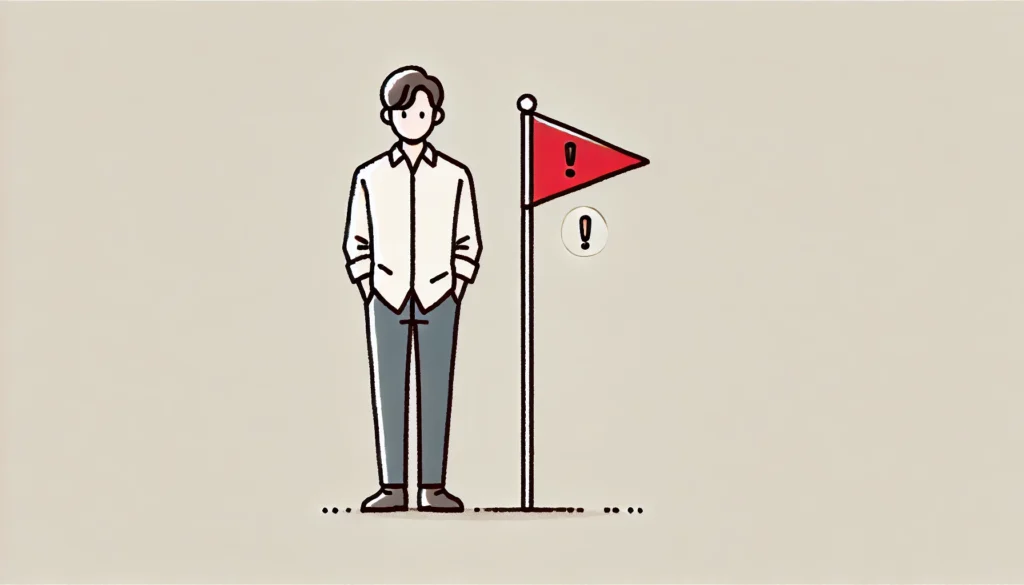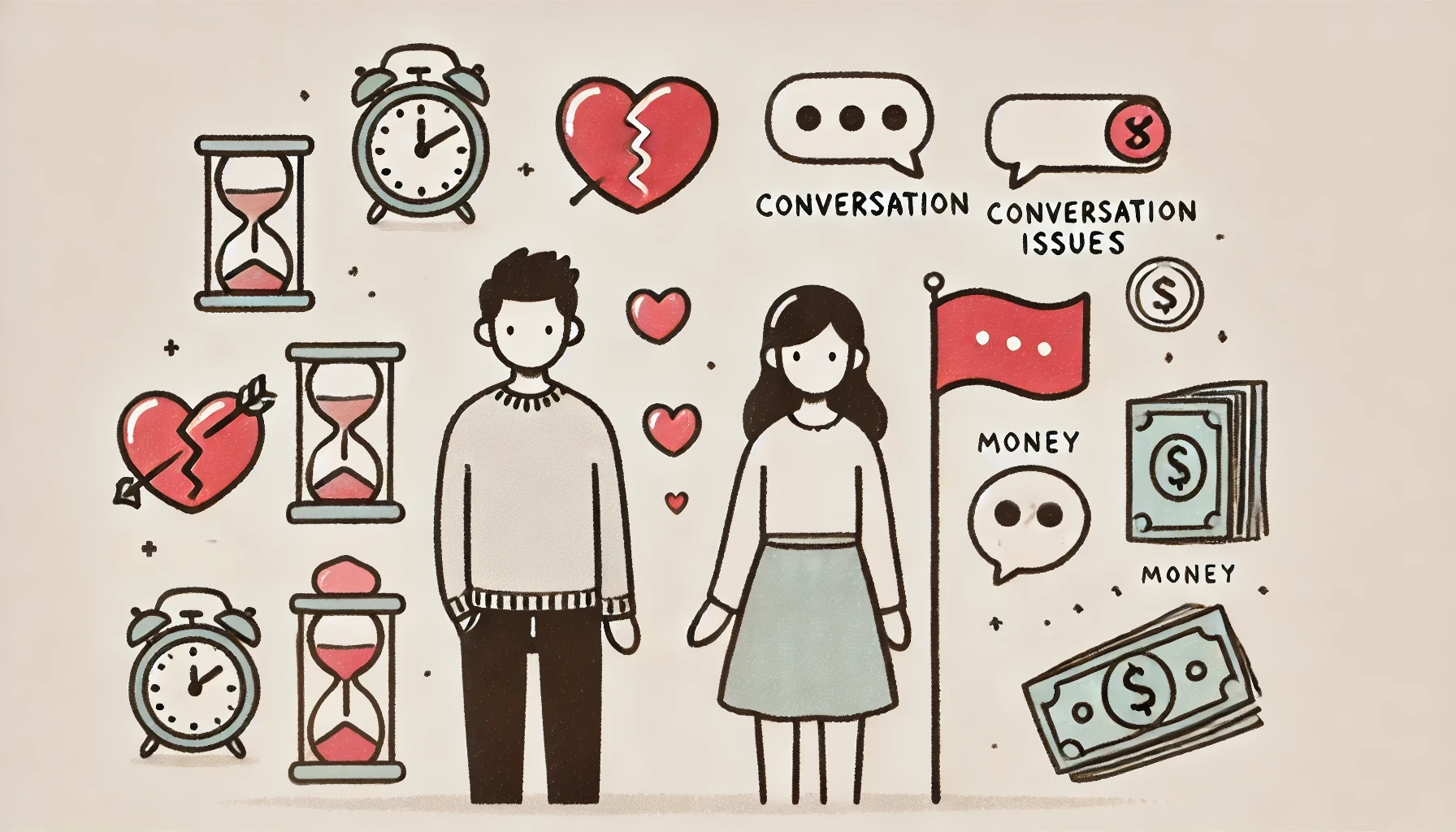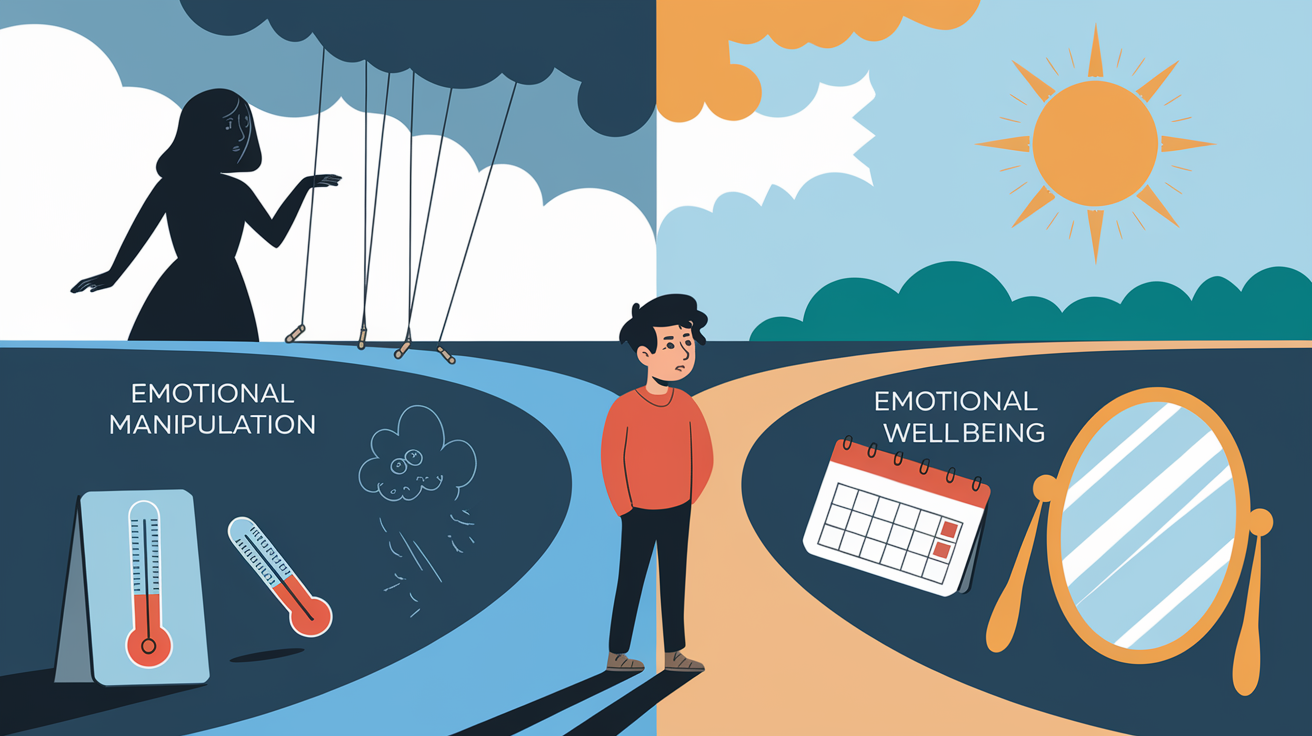Red flags in talking stage are something that everyone should pay close attention to, as they can reveal underlying issues before a relationship becomes serious. This stage is often filled with excitement and curiosity, but it’s also the perfect time to notice behaviors that might signal potential problems.
Being aware of these red flags early on can save you from emotional pain and help you make informed decisions about who you choose to pursue a relationship with.
So What is the Talking Stage Even?
In modern dating, the “talking stage” refers to the early phase of getting to know someone before officially labeling the relationship. It’s a period where two people engage in frequent communication, often to assess compatibility and build a connection.
Unlike traditional dating, where intentions might be clear from the start, the talking stage can sometimes be ambiguous. It’s a time of exploration, where both individuals gauge their interest in one another, but without any formal commitment.
This stage is crucial as it sets the tone for what could potentially evolve into a deeper relationship. However, it can also be a gray area, leading to confusion and misunderstandings if not navigated carefully.
Importance of Recognizing Red Flags
Recognizing red flags in talking stage is essential because this is when you’re still figuring out if someone is worth investing your time and emotions. Red flags are warning signs that indicate potential problems or unhealthy behaviors that could cause issues later in the relationship.
Since the talking stage is the foundation of what might become a more serious relationship, ignoring these signs can lead to emotional turmoil and even toxic dynamics. It’s easier to walk away at this stage than it is once deeper feelings are involved.
Therefore, being vigilant about red flags during the talking stage helps protect your emotional well-being and ensures that you’re making informed decisions about who you let into your life.
- ALSO CHECK: Relationship Etiquette For Noobs
General Red Flags in Talking Stage
So what are some genera stage stage red flags to look out for? When you’re in the talking stage of a relationship, it’s important to be aware of certain behaviors that might indicate deeper issues. Red flags in talking stage are early warning signs that something may be off, and recognizing them can save you from potential heartache.
Inconsistent Communication
One of the first red flags in talking stage is inconsistent communication. It has always been said that “Communication is key” But the consistency and quality of the communication also matters.
So if someone is regularly disappearing or only reaching out at specific times, such as late at night, it might indicate that they aren’t genuinely interested in developing a meaningful connection.
This pattern of behavior can be frustrating and often leaves you feeling uncertain about where you stand. Inconsistent communication suggests that the person may not be taking the relationship seriously, which is a significant concern if you’re looking for something more stable.
Overbearing Behavior
Another red flag to watch out for is overbearing behavior. This happens when someone tries to control or dominate the interaction early on.
They might dictate how often you should talk, what you should discuss, or even try to influence your personal decisions. This kind of behavior can be a precursor to more severe forms of control or manipulation.
It’s important to recognize overbearing behavior as a red flag in the talking stage because it often signals a lack of respect for your autonomy, which is essential for a healthy relationship.
Love Bombing
Love bombing is another critical red flag in the talking stage. This occurs when someone showers you with excessive attention, affection, and compliments from the very beginning. While it might feel flattering at first, it can be a manipulative tactic to create an artificial sense of closeness and dependency.
Love bombing often leads to an unbalanced relationship, where one person may feel pressured to reciprocate feelings or commitment before they are truly ready. It’s important to be cautious of this behavior, as it can mask deeper issues such as insecurity or a desire to control the relationship’s pace.
Disregard for Boundaries
A major red flag in the talking stage is a disregard for your boundaries. If someone constantly pushes or ignores the limits you’ve set—whether it’s about personal space, topics of conversation, or the pace of the relationship—it shows a lack of respect for your needs.
Healthy relationships are built on mutual respect, and boundaries play a crucial role in that. When someone disregards your boundaries, it’s a clear sign that they may not value your feelings or autonomy, which can lead to bigger problems as the relationship progresses.
Emotional Dumping
Emotional dumping is another red flag to be aware of during the talking stage. This happens when one person consistently unloads their emotional baggage onto the other without offering the same level of support in return.
While sharing feelings is normal in any relationship, it becomes problematic when it feels one-sided. Emotional dumping can leave you feeling drained and unappreciated, creating an unhealthy dynamic where your needs are neglected. Recognising this behavior early on is important, as it often indicates an imbalance in the relationship that could lead to emotional burnout.
Talking Too Often About Exes
When someone talks excessively about their exes during the talking stage, it can be a significant red flag. This behavior might indicate that they are not fully over their past relationships and could still be emotionally attached to their ex.
Constantly bringing up exes can make you feel like you’re being compared or that their focus is not entirely on getting to know you. It’s important to assess whether their references to exes are occasional or if they dominate the conversation.
If it’s the latter, it might be a sign that they are not ready to move forward with a new relationship, potentially leading to unresolved issues in the future.
Aggressive or Controlling Behavior
Another red flag that shouldn’t be ignored is any sign of aggressive or controlling behavior. This can manifest as a quick temper, the need to control how you spend your time, or even subtle forms of manipulation.
If someone becomes angry easily, tries to dictate your actions, or makes you feel afraid to express your thoughts, these are warning signs that they could potentially be abusive, either emotionally or physically.
It’s important to recognize these behaviors early, as they often escalate over time. A healthy relationship should make you feel safe and respected, not fearful or controlled.
Talking Stage Red Flags for Women
When you’re in the talking stage with a man, it’s crucial to stay alert to certain behaviors that might indicate deeper issues.

Red flags in talking stage for women can reveal a lot about a man’s intentions and character, helping you decide whether to pursue the relationship further. Being aware of these signs can save you from potential heartache and guide you toward healthier connections.
Lack of Respect for Time
A significant red flag in the talking stage is when a man frequently cancels plans or is otherwise unreliable. This behavior shows a lack of respect for your time and feelings.
If he consistently makes excuses, cancels at the last minute, or fails to follow through on commitments, it indicates that he may not prioritize you.
This lack of reliability can lead to frustration and signals that he might not be serious about building a meaningful connection. Respecting each other’s time is foundational for any relationship, and a man who doesn’t do this early on is unlikely to change his ways later.
Pushing for Early Intimacy
Another critical red flag is when a man pushes for physical intimacy too soon. If he seems overly focused on sex early in the talking stage, it might suggest that he’s more interested in a physical relationship than in getting to know you on a deeper level.
This behavior can make you feel pressured and uncomfortable, and it’s a clear sign that his priorities might not align with yours. It’s important to recognize this red flag because a relationship built primarily on physical attraction often lacks the emotional depth necessary for long-term success.
Badmouthing Exes
A man who consistently badmouths his exes during the talking stage is waving a big red flag. This behavior suggests unresolved issues and an inability to move on from past relationships. It also indicates a tendency to blame others for problems rather than taking responsibility.
If he speaks negatively about his exes, there’s a chance he might do the same about you in the future if things don’t work out. It’s important to consider how he talks about his past relationships, as this can give you insight into how he might handle future conflicts with you.
Financial Requests
One of the most glaring red flags in talking stage is if a man starts asking for money or financial help early on. This behavior is often a sign of manipulative intentions or a potential scam. Even if the request seems small or is framed as a one-time need, it’s crucial to be cautious.
A man who genuinely cares about you will respect your boundaries and won’t put you in a position where you feel obligated to provide financial support. If you encounter this red flag, it’s best to step back and reassess the situation before proceeding further.
Talking Stage Red Flags for Men
For men, navigating the talking stage can be just as tricky as it is for women. Recognizing red flags in talking stage is crucial to ensure that you don’t invest your time and emotions in someone who may not be a good fit. These warning signs can help you identify potential issues early on, preventing future problems and heartache.

Excessive Jealousy
A major red flag in the talking stage for men is when a woman exhibits excessive jealousy or mistrust. If she frequently questions your interactions with others or becomes overly possessive, it might indicate deeper insecurities.
This type of behavior can quickly lead to a toxic relationship where trust is lacking, and you may find yourself constantly trying to reassure her. Excessive jealousy is often rooted in personal issues that may not be easily resolved, and it can lead to significant strain in the relationship over time.
Disinterest in Your Life
Another red flag to watch out for is when a woman shows little to no interest in your day-to-day life. If she doesn’t engage in meaningful conversations or seems disinterested in your hobbies, work, or personal experiences, it could be a sign that she isn’t serious about building a connection.
A healthy relationship is built on mutual interest and engagement, so if she isn’t taking the time to get to know you, it’s worth considering whether she’s truly invested in the relationship or if she’s simply passing the time.
Testing Boundaries
Testing boundaries is another concerning red flag in the talking stage. If a woman continually pushes the limits you’ve set, whether it’s about how often you communicate, what you’re comfortable discussing, or your personal space, it might be a sign that she’s trying to see how much control she can exert in the relationship.
This behavior can lead to power imbalances and may set a precedent for more significant control issues later on. It’s important to establish and maintain your boundaries early on to ensure that both parties respect each other’s limits.
Emotional Immaturity
Emotional immaturity is another key red flag to look out for. If she struggles to communicate her emotions effectively, resorts to passive-aggressive behavior, or uses manipulation tactics like the silent treatment, it’s a sign that she may not be emotionally ready for a mature relationship.
Emotional maturity is crucial for resolving conflicts and building a strong, supportive relationship. If you notice these signs early on, it’s important to address them or reconsider the potential for a healthy partnership.
The Risks of Ignoring Red Flags
Ignoring red flags in talking stage can have significant consequences that extend far beyond the early phases of a relationship. These warning signs are there for a reason, and overlooking them can lead to a host of problems that affect not only your emotional well-being but also your financial stability and the overall dynamics of your future relationship.
Emotional and Psychological Impact
One of the most immediate risks of ignoring red flags is the emotional and psychological toll it can take on you. When you choose to overlook behaviors that make you uncomfortable or uneasy, it can lead to prolonged emotional distress.
Over time, this can erode your self-esteem and make you feel trapped in a relationship that doesn’t fulfill you. The constant stress of dealing with unresolved issues can also contribute to anxiety, depression, and other mental health challenges. It’s important to address these red flags early to protect your emotional well-being and avoid long-term psychological harm.
Financial Risks
Another significant risk of ignoring red flags, particularly those related to money, is financial exploitation. If you enter a relationship with someone who displays financial red flags, such as asking for money early on or being vague about their financial situation, you may find yourself being used for financial gain.
This can lead to severe financial losses, debt, and a sense of betrayal once the true intentions of the other person become clear. Financial stability is a crucial aspect of any healthy relationship, and ignoring signs of potential exploitation can have long-lasting consequences on your financial health.
Future Relationship Dynamics
The red flags you notice in the talking stage often set the tone for the dynamics of the relationship moving forward. If you ignore them, you might inadvertently set a precedent that allows toxic behaviors to continue unchecked.
This can lead to a relationship characterized by control, manipulation, and a lack of respect. Over time, these dynamics can become deeply ingrained, making it difficult to establish healthy patterns of communication and mutual respect. By addressing red flags early, you can either correct these behaviors or make the decision to walk away before they become a more significant issue.
Final Thoughts
As you navigate the talking stage, it’s important to remember that this phase is more than just a casual interaction—it’s the foundation for what could become a significant relationship.
Are you paying attention to how you feel during your conversations? Are you comfortable with the way things are progressing? These are essential questions to ask yourself as you consider whether to move forward.
The talking stage is your opportunity to evaluate whether this person aligns with your values and goals.
Are they someone who respects your boundaries and genuinely invests in getting to know you? Taking the time to reflect on these questions can help you make a confident decision about transitioning from the talking stage to a more official relationship.
In the end, a healthy relationship should feel like a partnership where both people are equally committed and supportive. If you find yourself constantly questioning their intentions or feeling uneasy, it might be worth reconsidering whether to move forward.
Trust your instincts, communicate openly, and don’t be afraid to step back if something doesn’t feel right. Your emotional well-being and happiness should always come first as you decide whether to take the next step in your relationship journey.






